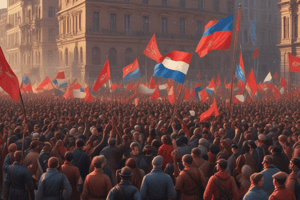Podcast
Questions and Answers
What does the 22nd Amendment prevent?
What does the 22nd Amendment prevent?
- A president from serving more than two terms (correct)
- A vice president from serving more than two terms
- A president from serving more than three terms
- None of the above
What is impeachment?
What is impeachment?
The power delegated to the House of Representatives to charge the president or other officials with Treason, bribery or other high crimes and misdemeanors.
What is executive privilege?
What is executive privilege?
An implied presidential power allowing the president to refuse to disclose information regarding confidential conversations or national security.
What was the significance of U.S. v. Nixon?
What was the significance of U.S. v. Nixon?
What does the Twenty-fifth Amendment address?
What does the Twenty-fifth Amendment address?
What is the Cabinet?
What is the Cabinet?
What is an executive agreement?
What is an executive agreement?
What is veto power?
What is veto power?
What is a line-item veto?
What is a line-item veto?
What is the War Powers Act?
What is the War Powers Act?
What does a pardon provide?
What does a pardon provide?
What are inherent powers?
What are inherent powers?
What was the New Deal?
What was the New Deal?
What is the Executive Office of the President?
What is the Executive Office of the President?
What is patronage?
What is patronage?
What is the Office of Management and Budget?
What is the Office of Management and Budget?
What is an executive order?
What is an executive order?
Study Notes
22nd Amendment
- Adopted in 1951, it limits a president to two terms in office or a maximum of ten years total.
Impeachment
- Constitutionally grants the House of Representatives the authority to charge the president, vice president, or other federal officials with treason, bribery, and high crimes or misdemeanors.
Executive Privilege
- An implied presidential power that enables the president to withhold information from Congress or the judiciary concerning confidential discussions or national security.
U.S. v. Nixon
- A landmark Supreme Court case clarifying that no absolute executive privilege exists, requiring the president to comply with court orders for evidence in criminal trials.
Twenty-fifth Amendment
- Ratified in 1967, it outlines procedures for filling presidential and vice-presidential vacancies and addresses presidential disabilities.
Cabinet
- Consists of presidential advisors who lead the fifteen executive departments, with additional advisors often included at the president's discretion.
Executive Agreement
- A formal agreement made by the president with another country that does not require Senate approval.
Veto Power
- The constitutional authority of the president to reject legislative bills, preventing them from becoming law unless both houses of Congress take further action.
Line-Item Veto
- Allows a chief executive to remove specific provisions from a bill related to taxation or spending, though the legislature can override this veto with a two-thirds majority.
War Powers Act
- Enacted in 1973, it restricts the president's ability to deploy military forces abroad without Congressional approval, limiting troop deployments to 60 days in peacetime.
Pardon
- An executive act restoring the civil rights of a person convicted of a crime, effectively forgiving the offense.
Inherent Power
- Powers assumed by the president that are not explicitly defined in the Constitution, often claimed to fulfill presidential duties or protect national interests.
New Deal
- President Franklin D. Roosevelt's plan to address the Great Depression, encompassing a series of economic recovery programs and reforms.
Executive Office of the President
- Established in 1939 to aid the president in managing the executive branch and overseeing bureaucracy.
Patronage
- The practice of awarding jobs, grants, or favors to political supporters as a reward for their loyalty and assistance.
Office of Management and Budget
- The agency responsible for preparing the president's annual budget proposal and analyzing departmental budgets, program reviews, and economic forecasts.
Executive Order
- A directive issued by the president that has the force of law, allowing for the implementation of policies without congressional approval.
Studying That Suits You
Use AI to generate personalized quizzes and flashcards to suit your learning preferences.
Description
Test your knowledge on the 22nd Amendment and other related concepts such as impeachment and executive privilege. This quiz includes flashcards that define key terms and their significance in American political context. Perfect for anyone studying U.S. government and constitutional law.




